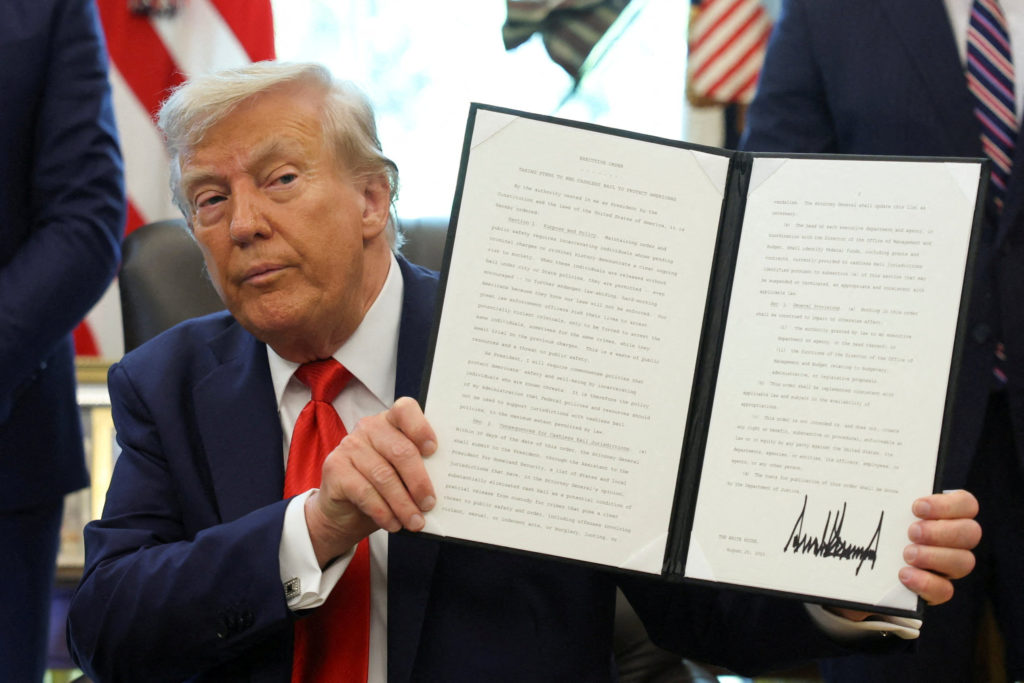
U.S. President Donald Trump recently signed executive orders that aimed to limit no-cash bail in the nation’s capital and across the nation – and has threatened the revocation of federal funds for those that don’t comply. This is seen as part of a White House effort to push crime-fighting to the top of the national agenda.
Cashless bail, known as personal recognizance or PR bonds, is a system in which suspects are released from jail while awaiting trial based on their promise to appear in court rather than paying out cash.
Critics of the policy, including Trump, say it reduces the incentive for defendants to show up for trial and puts public safety at risk by allowing them back on the street. Supporters say many low-income people can’t afford to post bond.
The orders mark Trump’s latest steps to broaden his control over the capital and use the power of the federal purse to try to bend institutions to his will, assertions of presidential power with little recent precedent.
Saying Washington, D.C. was gripped by a violent crime wave, Trump has temporarily seized its police force and allowed National Guard troops to carry weapons while on patrol in the city. He is also threatening to expand the U.S. military presence to cities including Baltimore and Chicago.
Critics have slammed the administration’s actions as unnecessary overreach, accusing Trump of manufacturing an emergency to seize greater control of Washington and target Democratic cities.
Trump nodded to the criticism, saying people are calling him a dictator for his actions.
“I don’t like a dictator. I’m not a dictator. I’m a man with great common sense,” Trump said.
The nationwide executive order directs U.S. Attorney General Pam Bondi to submit a list of local and state jurisdictions with cashless bail policies and identify federal funds in those places that could be “suspended or terminated,” according to a White House fact sheet.
Various investigations have extensively covered PR bonds and their impact on public safety in Colorado in recent years. One of such investigations includes the story of Martin Gonzalez Pena, who was arrested in 2021 for multiple serious drug offenses, including getting caught by an undercover Denver Police Officer carrying 20,000 fentanyl pills. After receiving a PR bond and walking out of jail without a single dollar of bail, he failed to appear in court.
Data available at the time showed in Denver, 69% of all serious drug offenders received no cash or PR bonds, and we also discovered 45% of the accused offenders who received those no cash bonds never returned to court, were never held accountable.
So now the question is, how does Trump’s executive order potentially impact the judicial system in Colorado?
The Colorado’s Attorney General’s office has said it will be reviewing the executive order and its potential impact on Colorado. Clearly, the announcement in Washington, D.C. was unexpected by many, and they are now scrambling to assess its impact.
That order also calls for the U.S. Attorney General to identify potential actions that could include restricting federal funding, services or approvals.
The nation’s capital was one of the first U.S. cities to largely eliminate cash bail in the 1990s. Under the city’s policy, a judge assesses whether a defendant should be released from jail based on their risk of not showing up for trial.
A 2024 analysis by the Brennan Center for Justice that looked at 22 cities that enacted bail reform, including cashless bail, and 11 that did not between 2015 and 2021 found no evidence of a link to overall crime trends or specific crimes like violent crime and larceny.
The White House referenced a 2023 study by the Yolo County District Attorney’s office in California that argued zero-cash bail led to more crime.
Colorado does not have a comprehensive statewide “cashless bail” system in the way that other jurisdictions do. Instead, the state has already implemented its own bail reform, most notably through House Bill 21-1280.
This 2021 law aimed to streamline the bail process and improve transparency. Key provisions included requiring jurisdictions to offer online bond payments and creating clear procedures for notifying inmates and the public about bonding rights. The law did not eliminate cash bail but addressed procedural issues.
As it stands, the greatest potential impact on Colorado would be from the possible withholding of federal funding. However, the extent to which this might affect Colorado is currently unclear. The state would need to be identified by the Attorney General as having a “cashless bail” policy, and the specifics of which funds could be withheld would need to be determined.




